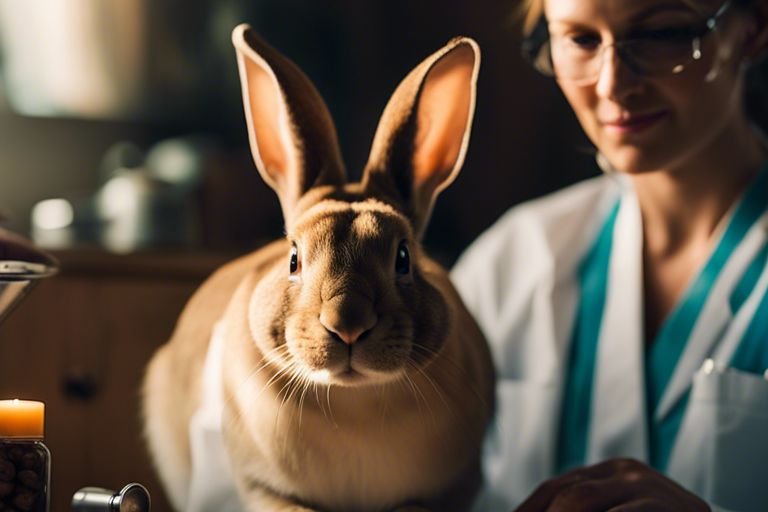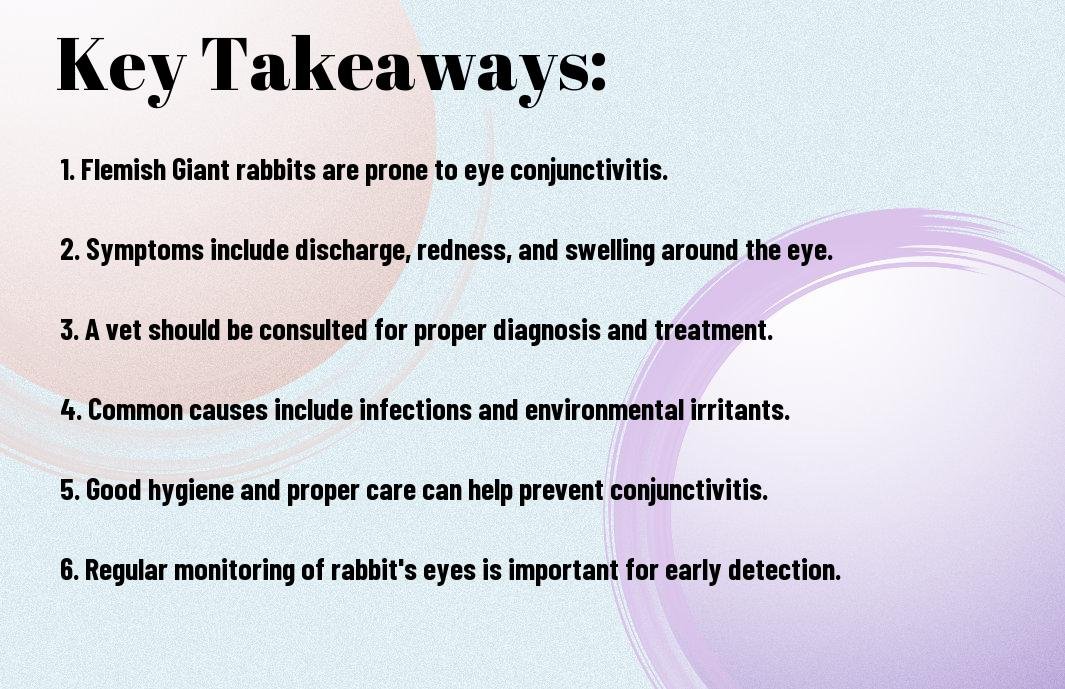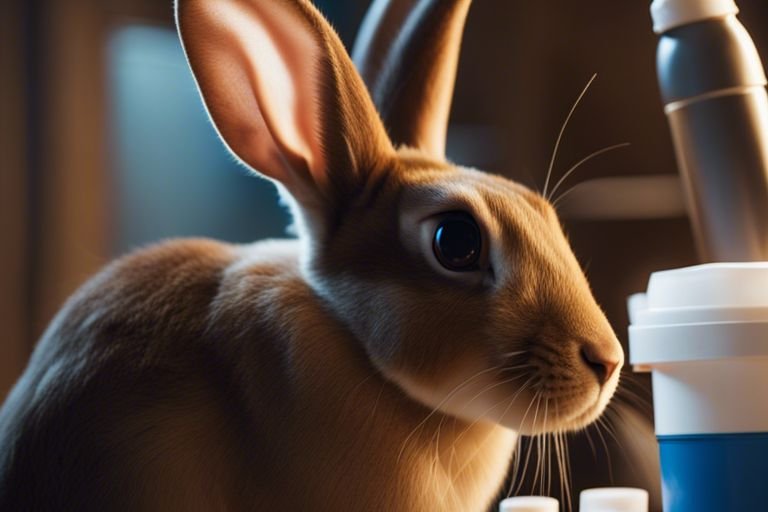Have you ever wondered if Flemish Giant rabbits can suffer from eye conjunctivitis? While this condition is more common in humans, it can also affect rabbits, including the beloved Flemish Giant breed. Eye conjunctivitis can be caused by a variety of factors, including bacterial infections, allergies, or environmental irritants. It’s important to be aware of the signs and symptoms of conjunctivitis in your Flemish Giant rabbit, as untreated cases can lead to serious eye damage and discomfort. In this blog post, we will explore the causes, symptoms, and treatment options for eye conjunctivitis in Flemish Giant rabbits, so you can keep your beloved pet healthy and happy.
Key Takeaways:
- Flemish Giant rabbits can indeed get eye conjunctivitis. This condition can be caused by a variety of factors such as bacteria, viruses, foreign objects, or allergies.
- Regular grooming and eye care can help prevent eye conjunctivitis in Flemish Giant rabbits. Keeping their environment clean and free from potential irritants can also minimize the risk of developing this condition.
- Early detection and prompt treatment are essential in managing eye conjunctivitis in Flemish Giant rabbits. As with any health issue, it is important to monitor your rabbit’s behavior and promptly address any signs of discomfort or changes in their eyes.
- Veterinary care is crucial in addressing eye conjunctivitis in Flemish Giant rabbits. A veterinarian will be able to accurately diagnose the cause of the conjunctivitis and recommend appropriate treatment, which may include antibiotics, eye drops, or other medications.
- Proper hygiene, a balanced diet, and regular check-ups are essential for maintaining the overall health and well-being of Flemish Giant rabbits. By taking these preventive measures, the risk of eye conjunctivitis and other health issues can be minimized, ensuring a happy and healthy rabbit.


Health and Nutrition
Obviously, just like any other pet, Flemish Giant rabbits require proper nutrition and care to stay healthy. You need to pay attention to their diet, exercise, and grooming habits to ensure they remain in good health throughout their lives. Here are some important factors to consider when it comes to the health and nutrition of your Flemish Giant.
Importance of Pet Nutrition
When it comes to pet nutrition, it is crucial to provide your Flemish Giant with a well-balanced diet that includes a variety of fresh hay, leafy greens, and high-quality pellets. Ensuring that your rabbit receives the right nutrients will not only keep them healthy and active but will also prevent various health issues, including obesity and dental problems. Remember to provide clean, fresh water at all times and avoid feeding your rabbit foods that are high in sugar or fat.
Common Health Concerns for Flemish Giants
Common health concerns for Flemish Giants include gastrointestinal stasis, which is a potentially life-threatening condition caused by a lack of proper diet and exercise. In addition, these rabbits are prone to ear mites, dental issues, and obesity if not provided with a balanced diet and regular exercise. Regular check-ups with a veterinarian and a proper diet and exercise regimen are vital to preventing these health issues.
Grooming and Shedding Management
Proper grooming and shedding management are essential for the overall health and well-being of your Flemish Giant. Regular grooming helps to prevent hairballs and ensures that your rabbit’s coat remains in good condition. Brushing your rabbit’s fur and providing a healthy diet will help minimize shedding and reduce the risk of hairballs. Additionally, regular nail trims and ear cleanings are important aspects of grooming to prevent potential health issues.
Behavior and Socialization
Despite their large size, Flemish Giant rabbits are known for their gentle and docile nature. They are generally friendly and enjoy interacting with humans and other animals. As a pet owner, it is important to understand their behavior and socialization needs to ensure their well-being and happiness.
Flemish Giant Temperament and Social Needs
As a pet owner, it is important to understand the specific temperament and social needs of Flemish Giant rabbits to provide them with the care and attention they require. These rabbits are known for their calm and gentle nature, making them great companions for families and individuals alike. They enjoy being around people and can form strong bonds with their owners. It is important to spend quality time with your Flemish Giant rabbit and provide them with opportunities for socialization to ensure they remain happy and well-adjusted.
Positive Reinforcement and Obedience Training
When it comes to training your Flemish Giant rabbit, positive reinforcement is key. These rabbits respond well to rewards-based training methods, such as using treats and praise to encourage desired behaviors. It is important to be patient and consistent with your training efforts, as these rabbits can be quite intelligent and will quickly pick up on cues and commands. By using positive reinforcement and patience, you can effectively train your Flemish Giant rabbit and strengthen the bond between you and your pet.
The Impact of Neutering on Behavior
Neutering your Flemish Giant rabbit can have a significant impact on their behavior and socialization. It can help reduce aggressive tendencies and territorial behaviors, making them more docile and easier to handle. Additionally, neutering can also help prevent certain health problems and increase your rabbit’s lifespan. It is important to discuss the option of neutering with your veterinarian to make an informed decision that is best for your pet’s well-being.
Prevention and Care
After learning about the potential for eye conjunctivitis in Flemish Giant rabbits, it’s important to understand the steps you can take to prevent this condition and provide the best care for your pet. By implementing a few key strategies, you can ensure the overall health and well-being of your rabbit.
Routine Check-ups and Vaccinations
Regular veterinary check-ups and vaccinations are essential for maintaining your Flemish Giant rabbit’s health. During these visits, your veterinarian can assess your rabbit’s overall well-being, provide necessary vaccinations, and address any potential health concerns. Additionally, routine check-ups allow for early detection of eye conjunctivitis or other health issues, providing the opportunity for prompt treatment.
Parasite Prevention and the Role of Grooming
Preventing parasites in your Flemish Giant rabbit is crucial for maintaining optimal health. Regular grooming, including brushing and nail trimming, not only keeps your rabbit looking and feeling their best, but also helps to prevent the occurrence of parasites such as mites or fleas. Parasites can contribute to eye conjunctivitis and other health issues, so maintaining a grooming routine is an important aspect of prevention.
Recognizing and Treating Eye Conjunctivitis
It’s important to recognize the signs of eye conjunctivitis in your Flemish Giant rabbit and seek prompt treatment if necessary. Common symptoms include redness, discharge, and excessive blinking or squinting. If you notice any of these signs, it’s crucial to seek veterinary attention immediately. Prompt treatment can help alleviate discomfort and prevent potential complications. In some cases, eye conjunctivitis can indicate an underlying health issue, so early detection and treatment are key. Remember, your veterinarian is the best source of information and guidance when it comes to your rabbit’s eye health.
Living with Flemish Giant Rabbits
However, as you consider bringing a Flemish Giant rabbit into your home, there are several important factors to consider. These gentle giants can make wonderful companions, but they require specific care and attention to thrive. Understanding what to expect when living with a Flemish Giant rabbit is crucial to providing them with the best possible care.
Housing and Exercise Requirements
When living with a Flemish Giant rabbit, it’s important to provide them with a spacious living environment to accommodate their large size. A large, sturdy cage or hutch is essential, with plenty of room for them to hop and stretch. Additionally, they will need access to a large, secure outdoor run to provide them with the opportunity to exercise and explore. It’s important to ensure their living space is kept clean and free from hazards, such as wires or small objects that they could ingest. Eye problems in rabbits: an overview can be a challenging concern, so regularly checking their eyes for any signs of redness or discharge is crucial.
Compatibility with Children and Other Pets
When considering a Flemish Giant rabbit as a pet, it’s important to assess their compatibility with children and other pets in your home. These rabbits can be gentle and tolerant, making them suitable companions for families with respectful and gentle children. However, their large size means that they may not be the best choice for homes with small children who may not understand how to handle them safely. Additionally, introducing them to other pets should be done with caution, as their calm nature may be misinterpreted by more energetic animals. Always supervise interactions between your rabbit and other pets to ensure their safety and well-being.
Long-Term Considerations: Pet insurance and Senior Pet Care
As with any pet, it’s important to consider the long-term responsibilities of caring for a Flemish Giant rabbit. Investing in pet insurance can help cover unexpected veterinary expenses, providing you with peace of mind and financial protection. Additionally, as your rabbit ages, they may require senior pet care to address age-related health concerns. Regular veterinary check-ups and a healthy diet can help support their well-being as they age, ensuring they enjoy a comfortable and happy life in their later years.
Can Flemish Giant Rabbits Get Eye Conjunctivitis?
From above information, it is clear that Flemish Giant rabbits are susceptible to eye conjunctivitis. It is important to monitor your rabbit’s eye health and seek veterinary care if you notice any redness, swelling, or discharge. Keeping their habitats clean and ensuring proper nutrition can also help prevent eye infections. By staying vigilant and proactive, you can help keep your rabbit’s eyes healthy and free from conjunctivitis.
FAQ
Q: Can Flemish Giant Rabbits Get Eye Conjunctivitis?
A: Yes, Flemish Giant rabbits can indeed develop eye conjunctivitis, which is also known as pink eye. This condition causes inflammation of the outermost layer of the eye and the inner surface of the eyelids. It can be caused by a variety of factors, including bacterial or viral infections, allergies, or irritants. It is important to monitor your rabbit for any signs of eye conjunctivitis and seek veterinary care if you suspect they may be affected.
Q: What are the symptoms of eye conjunctivitis in Flemish Giant rabbits?
A: Symptoms of eye conjunctivitis in Flemish Giant rabbits may include redness and swelling of the eye and surrounding tissue, excessive tearing or discharge from the eye, squinting or blinking, sensitivity to light, and visible third eyelid. Rabbits affected by conjunctivitis may also exhibit signs of discomfort, such as rubbing or pawing at their eyes. It is important to be vigilant for these symptoms in order to promptly address any potential issues with your rabbit’s eye health.
Q: How can I prevent eye conjunctivitis in my Flemish Giant rabbit?
A: To help prevent eye conjunctivitis in your Flemish Giant rabbit, it is essential to maintain a clean living environment and provide proper nutrition and grooming. Regularly inspect your rabbit’s eyes for any signs of irritation, abnormal discharge, or other issues, and consult with a veterinarian if you have any concerns. Additionally, avoiding exposure to potential allergens, irritants, or other rabbits with infections can also help reduce the risk of eye conjunctivitis. By being proactive and attentive to your rabbit’s overall well-being, you can help minimize the likelihood of them developing this condition.
